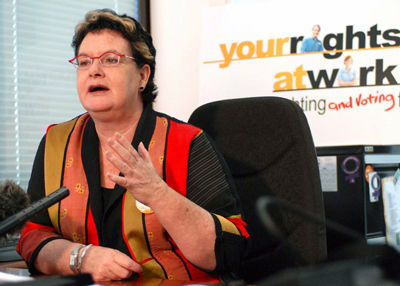
PITTSBURGH – As the AFL-CIO wrapped up its 26th Convention here and world leaders got ready for the G-20 summit next week, U.S. and international trade unionists are demanding a new global economy that is fair to workers.
On Sept. 17, the federation passed a resolution calling for coordinated efforts by the AFL-CIO and unions around the world to seek international solutions to the challenges facing the world’s workers.
Interestingly, world labor leaders don’t just see this as a question of the American labor movement helping out its brothers and sisters around the world. Many see it is as a question of them helping U.S. workers win rights that workers in other industrialized countries already have.
Sharan Burrow
During a break in convention proceedings Sharan Burrow, president of the Australian Council of Trade Unions, told the World, “Because this is a crisis that was made in America and has spread all around the world the solution demands major job-producing breakthroughs in the United States. Your efforts at winning major health care reform and passage of the Employee Free Choice Act are examples of what has to be done to help fix the entire global economy.”
Burrow also said, “The international labor movement has to put on the pressure during the G-20 summit. If the leaders have the guts to do it there will be a new world of possibilities.”
She said that cooperation by unions from all over the world is also needed to push up minimum wages all over the world. “By itself, this will amount to an enormous global stimulus package.”
On the last day of the convention, Bill Lucy, secretary-treasurer of AFSCME, thanked the many international delegates who attended and called on world leaders to increase their efforts to turn around the world economy. “Just as the global union movement is connected by solidarity and a shared commitment to social and economic justice, today we are connected by a worldwide economic crisis. Given the specter of a persistent global job crisis, there is an urgent need for a far more aggressive and internationally oriented recovery strategy.”
The resolution calls on the G-20 nations, including the United States, to dedicate more funding to economic recovery and job creation, as well as international union cooperation in protecting the freedom of workers to organize. It also demands that strong measures be taken to fix the broken international banking system.
As many as 50 U.S. labor leaders will join the national leadership of the AFL-CIO in returning to this city next week where they will join their international union colleagues to demand that global leaders address the international jobs crisis.
Led by newly elected AFL-CIO President Richard Trumka and International Trades Union Confederation President Guy Ryder, they plan to tell President Obama and the other leaders of the G-20 that a second round of world-wide stimulus spending, this time concentrated on immediate job creation, is urgently needed.
“The lessons to be learned from the economic catastrophe of the last year are that it just isn’t safe to leave the globalized economy in the hands of rampant global capital,” Ryder told the AFL-CIO convention on its closing day. “And government must step back into the ring of public life and meet its responsibility to protect and provide for all citizens – not just the few marked out by wealth and privilege for consideration by those in power.”
As the start of the G-20 approaches, there is concern that local officials are trying to curb dissent, reacting to past confrontations at global summits in Seattle and Miami that featured police violence against union protesters. Entrance into the city center, already limited to a few bridges over its rivers, will be more limited to three designated entry points.












Comments